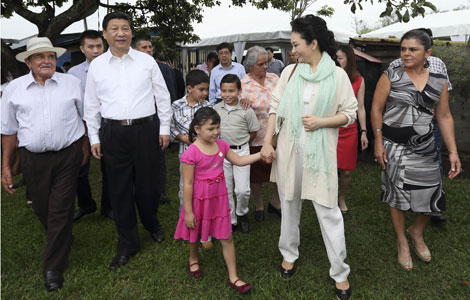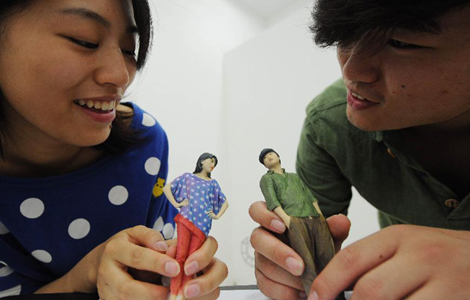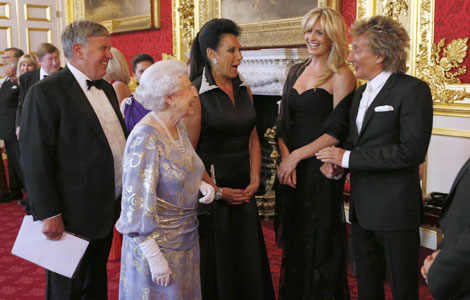Activists seek Obama apology over 1882 anti-Chinese law
Updated: 2013-04-10 10:58
By Zhang Yuwei (China Daily)
|
||||||||
In 1943, more than 60 years after it was enacted, Congress finally repealed the Chinese Exclusion Act, a discriminatory law that had suspended Chinese immigration to the United States and prevented those already in the country from becoming citizens. It was a historic move that gave the Chinese-American community justice for the first time since the late 19th century.
The law has since been acknowledged as wrong, and led to formal apologies from California and the US Senate and House of Representatives to all Chinese-Americans.
The National Council for Chinese Americans, a Washington-based nonprofit advocacy group, believes those expressions of regret aren't sufficient.
The council is leading a petition drive for the US president to issue a formal apology for the Chinese Exclusion Act. The petition also seeks to have Congress declare a National Day of Inclusion to promote diversity and tolerance in the US.

"Only the president has not closed this shameful chapter in American history with an apology," reads a petition on the White House's We the People website. It calls on President Barack Obama's administration "to apologize for the Chinese exclusion laws and reaffirm that the greatness of our nation was built on inclusion".
Under rules revised by the administration in January, any petition that gets more than 100,000 signatures in its first 30 days will receive an official response from the president's office.
The petition from the National Council for Chinese Americans was created on March 21. As of Tuesday night, it had received 2,777 signatures. It needs 100,000 by April 20.
Xue Haipei, president of the council, said that since the petition drive began, organizers predicted the 100,000-signature mark would be "difficult" to reach.
"It used to be 25,000, which is what we thought we would need, but the White House increased the threshold to be 100,000 signatures now," said Xue.
Xue said the petition is just one of three parts of the group's campaign for an executive-branch apology.
"We are talking with White House staffers and advisers directly and hope our voice will be heard through this direct dialogue," Xue said. The Congressional Asian Pacific American Caucus is also appealing to the White House to act, he said.
Xue said the apology sought from Obama has "historic and symbolic and political reasons", given that President Chester Arthur signed the Chinese Exclusion Act into law.
"So the US president bears part of the responsibility, and the presidency holds a special and highly symbolic place in American life," he said.
After passage of the 1882 legislation, Congress revisited it five times between 1884 and 1904, voting to impose ever-tighter restrictions on Chinese immigration and naturalization. Those subsequent laws also prohibited Chinese residents from voting, among other civil-rights violations.
Today, Chinese-Americans represent the country's largest Asian ethnic group, followed by Filipinos and Asian Indians, according to US Census Bureau.
Those who now enjoy the same rights as their fellow Americans, some in the community might find it hard to fathom that such laws existed.
"The Chinese community was nearly destroyed by this law, and many generations of Chinese suffered enormously because of this law," said Xue. "An apology from the president will greatly help Americans face our own history and try to learn from our mistake and help build a better democracy in this multi-ethnic society."
The laws have long been regarded as harsh and unjust by most Americans. In recent years, efforts to obtain official apologies have gained momentum.
The 1882 Project, a grass-roots initiative launched in 2010, has been at the forefront, attempting to educate public officials and the public about six decades of government-enforced injustice.
The organization worked with the 112th Congress to secure passage of two resolutions expressing the legislative branch's regret for having passed the original law and its progeny.
In July 2012, the House unanimously adopted a bipartisan resolution introduced by Representative Judy Chu, a Democrat and Chinese-American who represents California's 27th Congressional District.
The resolution formally expresses the regret of the House for the 1882 law and subsequent legislation that discriminated against people of Chinese origin in the US. Chu's was only the fourth resolution of regret in the past 25 years to be passed by both houses of Congress.
Xue, who is also a co-chairperson of the 1882 Project and has devoted two years to that campaign, said its work will continue even if the online petition fails to get enough signatures.
The work, he said, will help younger Chinese-Americans develop their self identity.
"It will make our children grow to be better citizens of this country, and it will make the Chinese community stronger," Xue said.
Contact the writer at yuweizhang@chinadailyusa.com
Most Viewed
Editor's Picks

|

|

|

|

|

|
Today's Top News
Relationship 'relaunched'
Good start expected for summit
Xi, Mexican president discuss bilateral co-op
Cooperation to drive mutual growth
Chinese president arrives in Mexico for state visit
China is victim of hacking attacks
US to be largest trade partner
China joins fight against hacking
US Weekly

|

|















